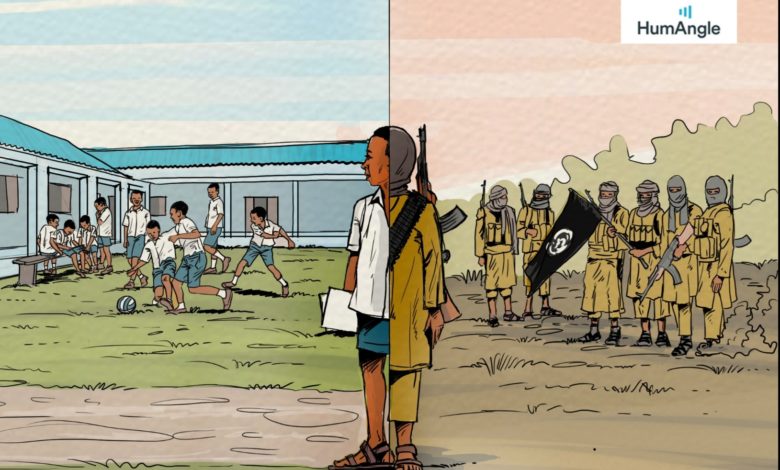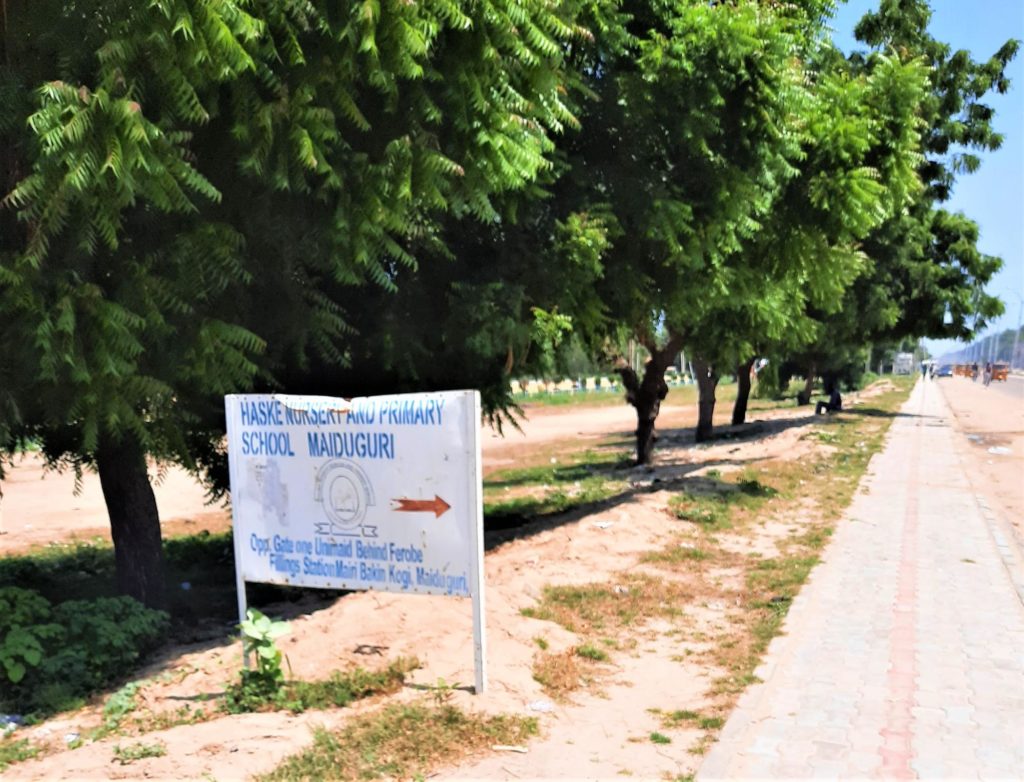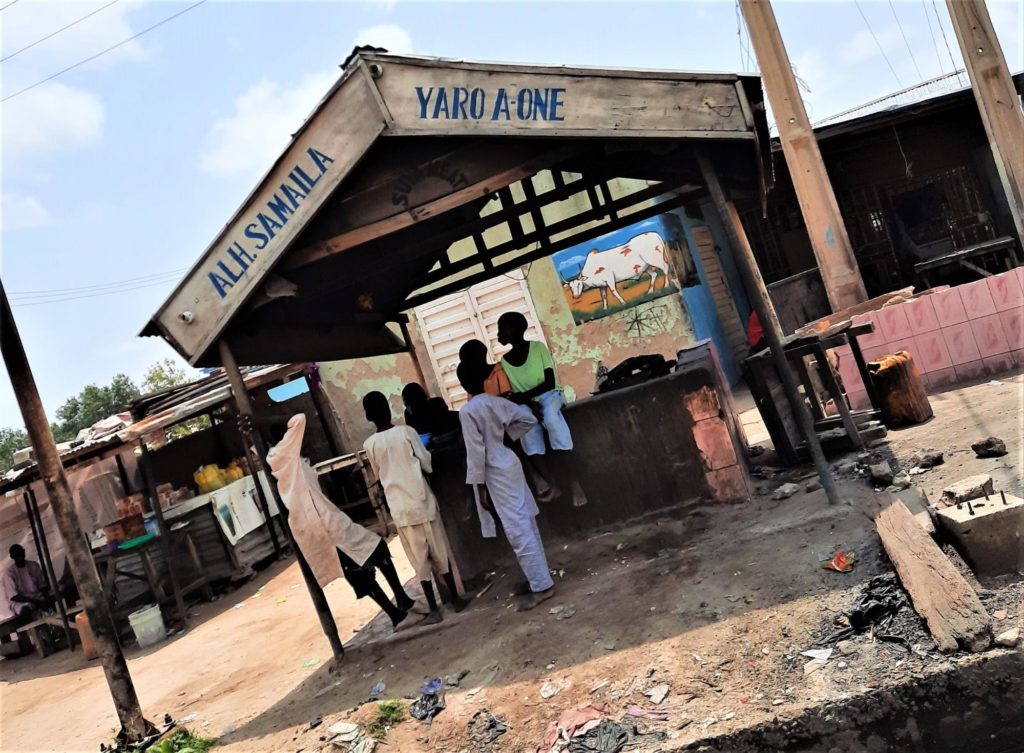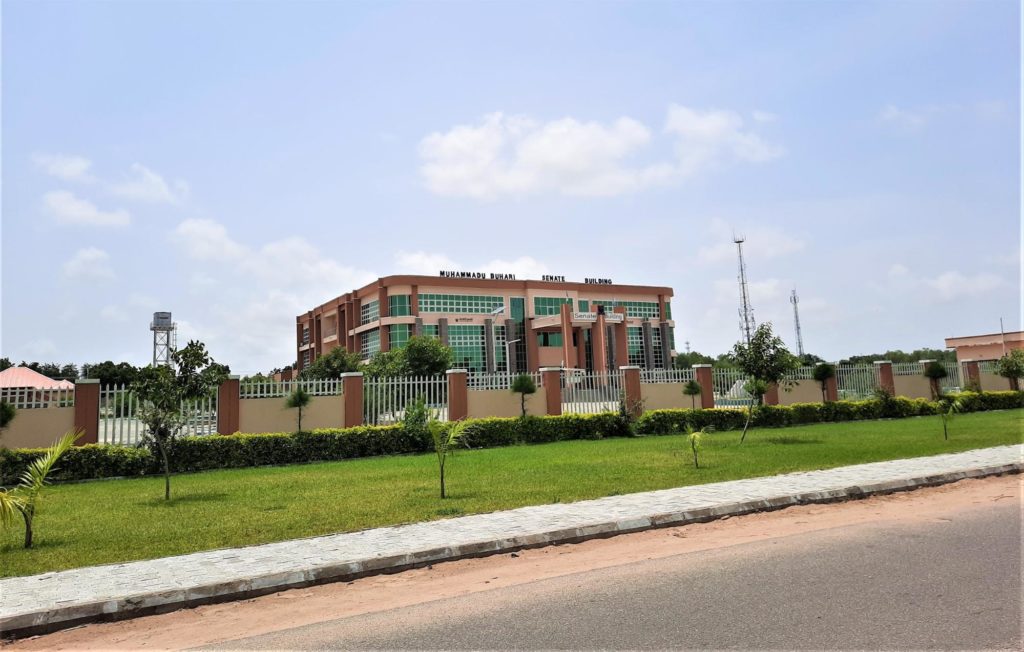The Deradicalised (4): He Left School To Join Boko Haram And Now Hopes To Go Back
This Operation Safe Corridor alumnus regrets pausing his education to join Nigeria’s vicious insurgent group and yearns to pick up where he stopped.

One moment, 12-year-old Mustafa* was preparing to write the Junior Secondary School Certificate Examination—the final lap in Nigeria’s basic education system. The next, he was teaching Boko Haram recruits how to fire all kinds of guns, having risen through the ranks in the group’s terrifying network of foot soldiers.
The young man hails from Abbaganaram, a community in Maiduguri, capital of Borno State. He had joined Boko Haram through some of his mates back at Abbaganaram Junior Secondary School. He says he initially did not know they were followers of Mohammed Yusuf, the group’s founder, and when he found out they forced him to join too.
Now 23, seated on the floor of one private residence in the suburbs of Maiduguri, Mustafa shares his experiences—but in hushed tones to avoid drawing attention to his cold-blooded past. Like many other men in the region, he spots a low cut, modest beard, and well-trimmed nails. A stocky man, his tummy bulges as he curls up on the ground. Unlike the typical dressing of a terrorist in the bush, Mustafa is wearing a blue t-shirt that hugs his potbelly and a pair of black joggers with parallel green stripes at the sides.
His story exemplifies an oft-repeated fact: that Boko Haram’s extremist ideology does not only appeal to stark illiterates. And that among its ranks are people with varying levels of educational qualification.
Boko Haram’s late founder declared ‘Western’ education prohibited for Muslims in many of his lectures, believing that the curriculum included lessons that run contrary to Islamic doctrines. “Like rain; we believe it is a creation of God rather than an evaporation caused by the sun that condenses and becomes rain,” he argued. He also rejected the theories of evolution and said Earth could not be spherical.
Yusuf himself is said to have dropped out of secondary school. He then travelled to Chad and Niger Republic to receive Quranic education, where he might have fallen for radical ideologies. In 2009, there were clashes between Yusuf’s followers and a Borno police unit, Operation Flush. His lectures became even more approving of violence and, in turn, the police invaded the group’s base, the Ibn Tamiyyah mosque in Maiduguri. The trailing gunfight was brutal, and civilians were caught in the crossfire.
Eventually, the military captured Yusuf, handed him over to the police and, shortly afterwards, only pictures of his lifeless, bullet-riddled body resurfaced. But before his death, Yusuf already appointed a deputy: the now-infamous Abubakar Shekau. So, rather than bring the insurgency to a stop, the radical cleric’s demise only further fuelled the inferno.
In the heat of the crisis, Mustafa moved quietly to Fallujah, a place in Bulabulin Ngarannam, Maiduguri, which served as a meeting point for Boko Haram members and had been nicknamed after an Iraqi city. He stayed here for many months under the supervision of two qa’ids (leaders): Muhammad Abdus-Salaam, who is now late, and Ba Abba, said to be currently detained at Giwa Barracks. Whenever the two were out of town, they deputised Abu Amir Al-Falluja. He would later join Mamman Nur to breakaway from Abubakar Shekau’s group and form what has come to be known as the Islamic State in West Africa Province (ISWAP).
At the age of 15, Mustafa travelled with the group to Kusuri, a remote town in Cameroon. They were there for two months before proceeding to Sambisa, a vast forest 60 km southeast of Maiduguri that has since been notorious as a hideout for terrorists. Though it is often said to stretch over about 60,000 square kilometres, the forest itself is only 518 square kilometres wide.
After spending a year in Sambisa, Mustafa relocated to Timbuktu in the Kaga Local Government Area of southern Borno and settled there for four to five years. The Timbuktu Triangle, which has remained a Boko Haram/ISWAP stronghold, is a section of the ill-famed Alagarno axis and extends to different Local Government Areas including Damboa.
“I was teaching the boys how to shoot and operate guns,” he says about his role. He himself received firearms training while in Sambisa. Some of his instructors, like Muhammad Abatcha and Mallam Ubba, had fought extremist wars in foreign countries before joining the Nigerian insurgent group.
Mustafa has five siblings and was raised by a single mother. In the early days, Boko Haram had warned him not to disclose his involvement to his family. When he eventually disappeared sometime in 2009, his family’s suspicions were confirmed, and they assumed he had either been arrested or wound up dead.

Life in Timbuktu
At first, “things were moving very well.” Mustapha Chadi, a respected amirul-jaish (commander-in-chief) later executed by Shekau, lived close to Mustafa’s terrorist camp. He led attacks in Baga, and his group often seized military vehicles along Maiduguri-Damaturu Road.
Many of the insurgents had received some level of formal education, especially those who came from Maiduguri. Those recruited from rural areas, on the other hand, were mostly illiterates.
One Monday morning in Dec. 2013, Mustafa returned to his hometown of Maiduguri—thirsty for havoc. He went in the company of hundreds of other heavily armed militants. Together, they attacked the international airport, an air force base, and other locations in the state capital for several hours. Fire was set to buildings, shops, and petrol stations. Vehicles and at least five helicopters and military aircraft were destroyed. The airport had to be briefly shut, and the government imposed a 24-hour curfew.
Back in Timbuktu, not every day was eventful. After the morning subhi prayers, immediately before dawn, the insurgents would proceed to a training site. At 10 am, they gathered to recite the Qur’an, the Muslim holy scriptures. If there were a planned attack, those enlisted would “go to war”. Others would go to their farms or whatever business they were engaged in while many lounged about to chat.
But everything was not as hoped. The insurgents constantly lived in fear of being attacked. They had only five to six vehicles, which affected their mobility, but had to move from one place to another during military offensives. Whenever they returned to old battlegrounds or areas raided by soldiers, they found that they had been burnt to a crisp.
“There is also the problem of hunger,” Mustafa says. “There were a lot of bad things happening there, things contrary to Islam, like discrimination among people. They killed for minor offences.”
One of those killed by the group was Muhammadu, a close friend of Mustafa and a Kanuri man from Masaa Fannari, a village close to Damboa. His execution was for the “simple offence” of stealing a phone battery, Mustafa says, adding that this had infuriated him. Ordinarily, the punishment meted out to people found guilty of theft by Boko Haram is cutting hands. But the leaders at Timbuktu had announced that they included the crime among capital offences.
“It is only in Sambisa that hands would be cut and we don’t have a vehicle to take you there. Whoever steals would be killed,” he says, quoting the commanders’ declaration.
The leaders were especially suspicious of spies working for the Nigerian military or opposing groups. They had been told that one of the tactics used by spies was to steal from some members and then plant the items in the bags of others as a way of sowing seeds of discord. So, they had concluded the best way to root out informants was to be strict on thieves.
Other offences that attracted the death penalty were adultery, homosexual activities, and insubordination. “First they would give you a warning, and if a person repeated the offence, he would be killed—as a lesson to others.”
This did not go down well with Mustafa, and it is one of three major reasons he eventually decided he had had enough.
The second reason was the traumatic experiences that came with constant fighting. Mustafa lost many of his friends during attacks on the 33 Battalion Army Barracks in Maiduguri, Konduga, Yadin Buni, and other places. In Konduga, over 300 insurgents were killed by the military. One of the fatalities was a childhood friend whom he attended school within Abbaganaram. He became discouraged from “going to war”.
“Then there was an attack on us that resulted in the death of so many of my friends except the one I left the bush with,” he says, referring to a young man called Abdulwahab. “It was then the whole thing got out of my mind, and I decided to leave it.”
Mustafa’s last straw was the infighting within the terror group—specifically between Shekau, who leads Boko Haram from a base in Sambisa forest, and Mustafa’s group in Timbuktu. Insurgents at the outpost perceived Shekau to be self-absorbed and unfairly furious about dissent. They repeatedly questioned his tactics, including the murder of Muslims observing prayers inside a mosque. Shekau reacted by killing leaders with contrary views and stopped providing the Timbuktu gang with weapons seized from the army even if they desperately needed them.
The rivalry between Sambisa and Timbuktu soon turned violent with loyalists on both sides attacking and killing each other. “I myself killed about five people,” Mustafa says. “About 30 of us gathered and decided to surrender. We came to understand that it was not about religion; they just wanted to make money and be sending us to get killed.”
Exiting extremism
When he set his mind to leave the life of a violent jihadist behind him, Mustafa could not disclose his plan to his wife. With the help of one of the group’s leaders, he had gotten married to Fatima, a 16-year-old girl captured from Bama, and they had had a child together. But he could not desert with her and their son, Ali. One, her parents also stayed in Sambisa forest, and she would not want to be away from them. Then, according to Mustafa, “she had a deep Islamic knowledge and was too fanatical.”
He could tell because she always corrected him if he did something wrong and, when he started complaining about the wanton killings of members, she even threatened to report him. He concluded she was best kept in the dark. Still, he had to devise a way to get rid of her so she would not find out on her own.
“I stopped getting foodstuff for two days,” he recounts his ploy with pride. “She had to report me to our leader. I had secretly gotten someone to sneak food into the house. So I argued that I still shopped and there was foodstuff at home even then. I complained she did not love me and used that as an excuse to divorce her.”
The exit plan was simple. Mustafa and Abdulwahab would be the first to surrender and, if the Nigerian government granted them a pardon, they would send word for others to join them.
The duo surrendered with the help of a hunter, Baba Maigiwa. Their first encounter was in 2014 when he offered to negotiate for the release of over 200 schoolgirls abducted in Chibok, Borno State. But the insurgents warned him that he would surely be killed if he embarked on that mission. Baba Maigiwa heeded their warning and dropped his phone number.
“Abdulwahab called and talked to him. He took us to someone who also connected us on the phone with a DSS [Department of State Services] commander. They said they would come and pick us from Maiduguri,” Mustafa recalls.
The two men hitched a ride and alighted along the Maiduguri-Potiskum Road between Njimtilo and Jakana. Then they contacted the security agency, which sent men to pick them up. They were immediately taken to Abuja. The year was 2017.

Jihadist turned peace advocate
Mustafa and Abdulwahab were held in what appeared to be a rented apartment somewhere in Nigeria’s capital city. Soldiers always guarded the property and bought whatever they needed for them. They remained at this location for two years and spent much of that time persuading other Boko Haram members to surrender.
Mustafa made the first call to Timbuktu two days into their arrival in Abuja, informing the others they were safe. Of those who remained, eight surrendered immediately. The military detained them first at Giwa Barracks in Maiduguri before also transferring them to Abuja.
Over the months, they convinced other insurgents to drop their arms and embrace peace. By Mustafa’s estimate, he could directly get 50 people to surrender, but the total figure could be up to 300.
“They knew us when we called them. Some would say we have joined the infidels and that they would kill us if they get us. Some would understand and accept to submit themselves,” he summarises his experience.
“There was one boy whom we told that the Boko Haram leaders were just using them: ‘They send you to battles to be killed and eat the good food while you eat bad food.’ The boy then investigated and got convinced when he found out that some [of the leaders] were eating “foreign food”. More were coming out, some of them through their friends. Later, the leaders threatened to kill anyone whose phones had our numbers.”
In return for their services, he says the military had promised to give them enough “to be comfortable”—but has so far not kept this promise. He adds that he has been in touch with their caregiver in Abuja, but no support has so far been given to them.
Meanwhile, some of the insurgents who became convinced to surrender have since returned to the terrorist group out of frustration and lack of gainful employment.
“They say it is better to survive even with farming. I know five; one of them even used to call me on the phone,” Mustafa tells HumAngle. It is not the first time a “repentant militant” would make this observation, which has also been corroborated by locals.
Safe Corridor
According to Mustafa, the Nigerian military did not only promise him and his colleagues amnesty, they also assured him of capital to start a business, housing, and support to further his education—“but they didn’t fulfil these. Instead, they took us to the Safe Corridor and released us after six months. But nothing was given to us.”
Operation Safe Corridor (OSC) was launched fully in 2016 by the Defence Headquarters as a multisectoral deradicalisation programme. It “is geared towards rehabilitating and reintegrating the repentant and the surrendering Boko Haram members back into normal life in the society,” former Acting Director of Defence Information, General Rabe Abubakar, stated right after the launch.
“The reluctant Boko Haram members should therefore see wisdom in surrendering now, thereby saving themselves from the imminent calamity that is about to fall on them in the event of the military mop-up if they continue in their unwholesome acts,” the general had added, making it obvious the programme was also established to contribute to deescalation.
The OSC has its deradicalisation camp based in Gombe State. Despite widespread criticism from those who consider it premature or a misplacement of priorities, the programme has since gone on to graduate hundreds of former Boko Haram members.
Mustafa does not mince words. “Our stay in Gombe was a waste of time; we were not satisfied,” he says matter-of-factly. “They said they would teach you skills but people did not learn anything there. We were bored. What we understood best were the lessons on drug abuse and psychology. And what the religious scholars taught was not new to us; but most of those from the villages benefited from the lessons.”
His assessment matches that of another OSC graduate who, speaking to HumAngle, described the religious lectures as unimpactful.
He was part of a special set of OSC alumni enrolled right after the third batch. Based on his interactions with other participants and in line with this paper’s earlier findings, he estimates that about 60 per cent were either innocent civilians or were tricked into joining Boko Haram without understanding the group’s ideologies.
“The food is bad,” Mustafa says, adding that they could not eat sometimes because it caused heartburns. According to Amnesty International, seven participants lost their lives due to “inadequate food and health care as well as the lack of safety in vocational training.” HumAngle understands the deaths were linked to food poisoning caused by the poor handling of chemicals used during cosmetology lessons.
He was released from the deradicalisation camp in late 2019 and afterwards spent two days at a rehabilitation centre in Maiduguri. “The commandant had said that anyone who comes to Safe Corridor would be given money but they didn’t give us anything,” he complains.
Security Risk Management and Intelligence Specialist Dr Kabir Adamu believes one of the reasons the OSC programme has not been very successful is that the military occupies the driver’s seat in what was originally conceived as a civilian-led exercise. As a result, it becomes difficult for independent groups to assess the programme’s effectiveness and give recommendations where there are gaps.
He also points out that the deradicalisation programme is just one of four components that make up Nigeria’s CVE (Countering Violent Extremism) framework. The rest are cooperation with neighbouring countries, economic rejuvenation of ravaged communities, and strategic communication.
“Unfortunately, because the other components have not been achieved, that means you are releasing these graduates into the same society that in the first place radicalised them. What we are seeing is the possibility of another radicalisation cycle,” he observes.
“What are these conditions? Unemployment, deprivation, lack of opportunities in the society, and then add rejection and stigmatisation to these and you understand why it is easy for the deradicalisation to be reversed.”
Dr Adamu advises that state governments should be carried along in the implementation of the CVE framework as the federal government, through the military, is already “taking up more than it can chew”. He additionally recommends that former OSC clients be monitored after their graduation to correct deviations.
HumAngle contacted Major General John Enenche, coordinator of the Defence Media Operations, to ask about Mustafa’s allegations about the programme and the claim that some members of Boko Haram who previously surrendered have returned to the terrorist enclaves. He, however, replied that he only answered questions at the agency’s press briefings and from journalists who had been accredited.

‘Leaving school was a mistake’
Unlike many other OSC graduates, Mustafa did not seek refuge in a displacement camp after his release. His brothers were at the rehabilitation centre to pick him. He had initiated contact with his family while in Abuja and they continued communicating during his stay in Gombe. They were expecting him and, eventually, “were happy to see” him.
Only a few people in his neighbourhood, asides his family, are aware of his previous loyalty to Boko Haram. These include the area’s bulama (ward head) and chairman of the Civilian Joint Task Force (CJTF), who wrote a testimonial for him at Gombe.
So, what is he doing for a living? Nothing, he replies, “I am jobless. It is difficult to get a job here.” He, however, hopes to start a business if he gets enough money. “I have a friend in Kaduna. I would buy women’s clothes and bring them here to sell,” he pitches his plan.
He voices his disappointment several times about the government’s failed promises but, it seems, none has bothered Mustafa more than his inability to return to the classroom.
He had been asked by Boko Haram to quit schooling as a prerequisite to joining. Now back in the same community he grew up in, he sees his former classmates doing well for themselves. Some, including one of his brothers with whom he had been in the same JSS class, are on their way to bagging Higher National Diplomas (HNDs). This fills him with deep regret.
Dr Adamu describes access to education as “absolutely important” not just for former militants but citizens generally to better themselves. He encourages states to support the federal government in ensuring more people, like Mustafa, realise their academic goals.
“I will return to school if I get the opportunity,” Mustafa says, his tone both assertive and downcast. If he could turn back the hands of time, he adds for emphasis, he would even have left town to continue his education elsewhere, rather than bowing to pressure from his peers.
“I want to go and read technology. I also like to draw because I am very good at it,” he enthuses, a bit louder now. The stuffy room in the suburbs of Maiduguri seems to become less sombre as his words slowly settle.
This is a multiple-part report; click here to read other ‘The Deradicalised’ stories.
Through this series, HumAngle with the support of the Africa Transitional Legacy Fund (ATJLF) examines the lives and pasts of alumni of the Federal Government’s deradicalisation and rehabilitation programme, Operation Safe Corridor.
Support Our Journalism
There are millions of ordinary people affected by conflict in Africa whose stories are missing in the mainstream media. HumAngle is determined to tell those challenging and under-reported stories, hoping that the people impacted by these conflicts will find the safety and security they deserve.
To ensure that we continue to provide public service coverage, we have a small favour to ask you. We want you to be part of our journalistic endeavour by contributing a token to us.
Your donation will further promote a robust, free, and independent media.
Donate HereStay Closer To The Stories That Matter




